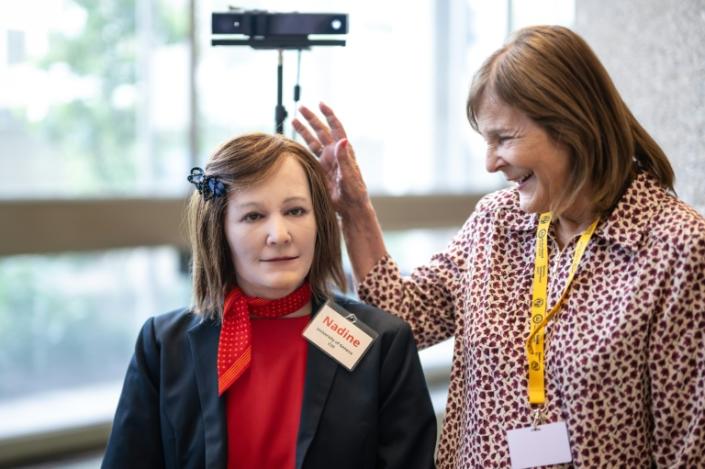
The mind-boggling growth of artificial intelligence raises many questions that have yet to be answered, the United Nations admitted on Thursday at its AI summit, which was attended by exceptionally lifelike humanoid robots.
The UN is aware that AI technology is beyond the ability to define its limits and directions, and so it has brought together some of the best minds on the subject, both human and man-made.
The ‘AI for Good Global Summit’, in Geneva on Thursday and Friday, is hosted by the United Nations’ technology agency ITU – and many unwitting attendees were startled by the humanoid robots that suddenly turned to stare at them by the way.
“When generative AI shocked the world just a few months ago, we had never seen anything like it. Nothing like it. Even the biggest names in tech found the experience breathtaking,” said ITU chief Doreen Bogdan-Martin at the summit. .
“And just like that, the possibility that this form of intelligence could become smarter than us has come so close that we never thought – including those behind the technology.”
– No answers –
The summit brings together around 3,000 experts from companies such as Microsoft and Amazon as well as universities and international organizations to try to create frameworks to ensure that AI is used for positive purposes.
Bogdan-Martin described an alternate nightmare scenario in which AI endangers millions of jobs, misinformation spreads widely, and unchecked advances in AI lead to “social unrest, geopolitical instability, and economic disparity. on a scale we have never seen before”.
“A lot of our questions we have about AI are not yet answered. Should we take a break from giant AI experiments? Will we control AI more than it controls us? And the ‘Will AI help humanity, or destroy it? she asked.
The robots gathered in Geneva came in many forms: dogs, agricultural machinery, but also avatars of exceptional realism, singers, artists and workers in retirement homes.
With cameras in their eyes, many actively followed what was going on around them: following movements, answering questions, smiling, frowning and even rolling their eyes.
The Jam Galaxy Band features the humanoid robot Desdemona – Desi to her friends – on lead vocals.
Created by roboticist David Hanson, she throws jazzy lyrics on all sorts of topics – love, credit cards, backyard dating – and the band interacts and goes with it.
“It’s pretty amazing. You might think it’s weird but it’s really cool because his AI-generated lyrics are really out there,” said soprano saxophonist Dianne Krouse.
“I just improvise around it and do some interpretive sax on what she sings.”
– Conscious robots –
Nadine, a robot inspired by University of Geneva professor and virtual human pioneer Nadia Thalmann, was first built in 2013 and can answer questions on the spot.
“I was created to be a humanoid social robot, with a human-like physical appearance, to interact with people and explore the potential of AI technologies,” Nadine told AFP.
“I feel excited and curious about the AI for Good Global Summit and the potential of AI technologies,” said the robot.
“The most interesting person I met at the AI for Good Global Summit is Professor Nadia Thalmann. She is the one who created me and is a pioneer in the field of AI robotics.”
“She’s very loyal!” added Thalmann with a laugh.
Nadine has improved tremendously over the years and Thalmann says that in the future, “she will be better able to understand her surroundings, ask direct questions – so not just answer questions – analyze more and to be more aware of what is going on.
“Because most robots are not conscious. They can talk but they are not aware of what they are saying.
“It will take years, because it’s quite complex. Self-awareness would be even more complex.”
rjm/apo

